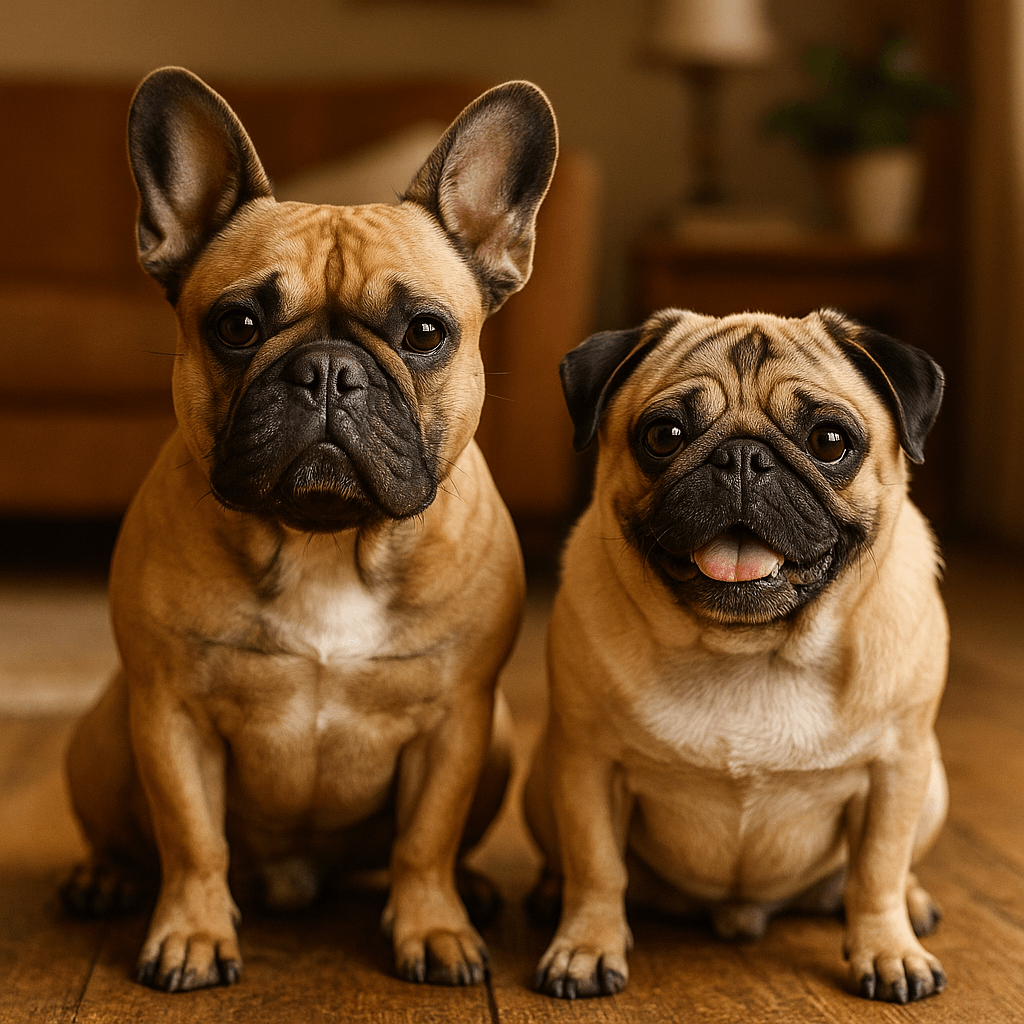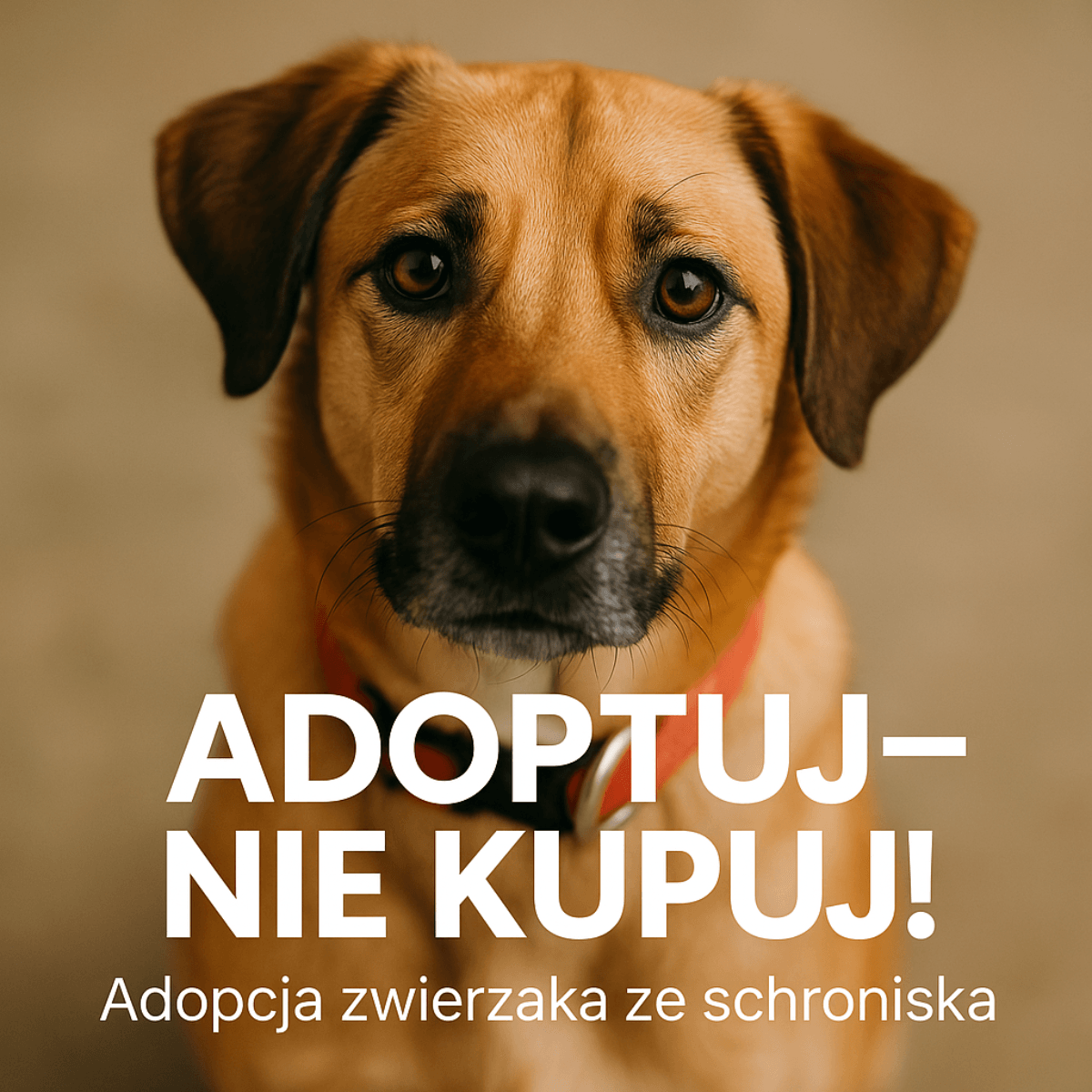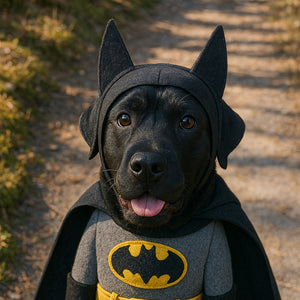
French Bulldog vs. Pug – Which of these adorable dogs will steal your heart?
The French Bulldog and the Pug are two incredibly popular breeds that have captured the hearts of owners worldwide. Their large, round eyes, playful expressions, and infectious charm make them irresistible. Both breeds are captivating and endearing—not only with their appearance but also with their devotion to their humans.
But if you think they're just "two sweet little meatballs" that differ only in coat color, you're wrong. Each breed has its own unique personality, needs, and health challenges. Choosing between a Pug and a French Bulldog is a decision that should be based not on appearance, but on your lifestyle and what you expect from a dog.
Wondering which one will fit better in your home? Which one will be more sociable, quieter, healthier, or easier to care for? This article will give you all the answers – we'll present the pros and cons of both breeds, compare their temperaments and requirements, and reveal who will love whom more.
Let's get started – because one thing is certain: the decision won't be easy, but it will definitely be sweet.
📊 Basic comparison
| Characteristic | French Bulldog | Pug |
| Libra | 8–14 kg | 6–9 kg |
| Growth | 28–33 cm | 25–30 cm |
| Average life expectancy | 10–12 years old | 12–15 years old |
| Activity | Moderate | Low to moderate |
| Hair | Short, smooth | Short, double layer |
| Care | Low, but requires attention to folds | Moderate (molting, folds) |
| Tendency to snore | Very large | Very large |
| Heat tolerance | Low | Low |
| Cold tolerance | Moderate | Low |
🧠 Character and personality
French Bulldog
This dog has a strong personality, but also immense charm. He's very sociable, bonds with his owner, and loves being the center of attention. He's not overly noisy and thrives in an apartment. He has plenty of energy, but doesn't require long walks—he prefers short explorations of the neighborhood followed by a relaxing session on the couch. He loves to play, but can also be stubborn, so it's worth putting some effort into training him.
This is a very emotional breed – the Bulldog can become offended if he feels left out, but he also responds happily to your every glance and invitation to play. He enjoys being close to people, often falling asleep at his feet or on his lap. He's comical, disarming, and it's impossible to be bored around him.
Pros:
- friendly and funny
- feels good with children
- does not require long walks
Cons:
- stubborn, more difficult to train
- tendency to have breathing problems
Pug
Pugs are typical "companion dogs" – cheerful, affectionate, and loyal. They love being close to their owners and don't tolerate loneliness well. Their personality is a blend of joie de vivre, gentleness, and... a touch of theatricality – they can make googly eyes and express their emotions with their whole bodies.
The Pug is a dog with the soul of a comedian, but also a philosopher – he can lie on the couch for hours, looking at you as if pondering the meaning of life. He is gentle, patient, and exceptionally family-oriented. He gets along well with children, doesn't show aggression, and tends to avoid conflict. He enjoys routine, repetition, and harmony in the home.
Pros:
- ideal for families, seniors and homebodies
- intelligent and easy to train
- disarming facial expressions
Cons:
- snores and drools
- heavy moulting, especially in spring and autumn
🏠 Housing conditions
Both the Pug and the French Bulldog thrive in apartments – they're typical couch potatoes who value comfort, closeness, and peace. They don't require a garden, large spaces, or daily physical challenges. They're ideal breeds for those living in cities, apartment buildings, or tenement buildings.
French Bulldogs thrive in smaller spaces, but it's worth providing them with their own corner with a soft bed. They enjoy observing what's going on in the house and often change their resting place, so it's good to have more than one "nest."
The Pug , on the other hand, loves rituals – they like to fall asleep in the same place, eat at the same time, and go out on familiar paths. They are more sensitive to disruptions in harmony and loud noises. It's worth remembering that both breeds tend to be "the guardian's shadow" – they will follow you around the house, sit by the bathroom door, and demand closeness. Therefore, they are good for people who spend a lot of time at home or work remotely.
Directions to the apartment:
- Avoid slippery floors – consider anti-slip rugs or mats to protect their joints.
- Provide ventilation and air conditioning – both breeds have difficulty with thermoregulation.
- Steps onto the couch or bed can be helpful – especially for older or overweight dogs.
Note: Both breeds do not tolerate heat well, so in the summer it is worth providing a cool, shady place to rest and avoid walks in full sun.
🩺 Health and Care
The flat muzzle typical of both breeds is associated with brachycephalic syndrome – breathing problems, snoring, and exercise intolerance. Both breeds also have a tendency to be overweight, so a well-balanced diet and avoiding overfeeding are important. Additionally, Pugs and French Bulldogs often struggle with skin problems (especially in the folds of their muzzles), as well as eye and musculoskeletal disorders.
Bulldogs are more likely to have problems with the spine and rear end of the body (e.g. hemivertebra), while Pugs may experience eyeball prolapse, entropion, and dysplasia.
It's worth remembering that these breeds may require regular consultation with a veterinarian specializing in brachycephalics. Periodic surgical procedures (e.g., nostril dilation, soft palate correction) may also be helpful for dogs with significant breathing difficulties.
📌 Read more: Dysplasia and joint diseases in small dog breeds – diagnosis, prevention, treatment
Common health recommendations:
- regular cleaning of skin folds
- weight control and proper diet
- limiting physical activity in hot weather
💸 Living costs – who provides cheaper care?
Although the Pug and French Bulldog are small dogs, their costs can differ, particularly in terms of health. The French Bulldog may require more veterinary care, while the Pug requires more grooming.
Approximate monthly living costs:
| Category | French Bulldog | Pug |
| Good quality food | 150–200 PLN | 100–150 PLN |
| Veterinarian (average) | 80–200 PLN | 50–120 PLN |
| Care | 30–50 PLN | 50–70 PLN (frequent shedding) |
| Accessories and toys | 30–60 PLN | 30–60 PLN |
🐕 The most common myths about breeds
Many stereotypes have arisen around the Pug and French Bulldog, which can be misleading for prospective owners. It's worth debunking them so that you can make a decision based on facts, not myths.
"Pugs are just lazy noodles" – Pugs do love naps, but they also have a surprising amount of energy when you encourage them to play. They love short activities, fetching toys, and brisk walks – although they'll gladly retreat back under their blankets afterward.
"Bulldogs are aggressive" – that's a myth! They're very gentle and sociable dogs. Their demeanor can be deceptive, but their temperaments are pure gold. In reality, French Bulldogs are very family-oriented, friendly, and often avoid conflict with other dogs.
"Neither breed needs activity" is not entirely true. While they aren't athletes, they do need walks and stimulation to maintain their weight and fitness. The French Bulldog enjoys exploring, while the Pug values repetition and daily rituals. Both breeds enjoy being active when accompanied by a beloved owner.
"They're not suitable for families with children" —quite the opposite! Both breeds are exceptionally patient and gentle. Pugs are more laid-back, and bulldogs love to play—but children should be taught to respect these dogs' delicate build.
"They're stupid and untrainable" is a very harmful myth. Pugs and bulldogs are intelligent, but they have independent personalities. They require patient, gentle training based on positive reinforcement. When they feel motivated (e.g., a favorite treat), they can surprise with their ingenuity and commitment. – not entirely true. Although they aren't athletes, they need walks and stimulation to maintain their weight and fitness.
📋 Features Comparison Table
| Characteristic | Pug | French Bulldog |
| Attachment to the caregiver | ★★★★★ | ★★★★★ |
| Independence | ★★☆☆☆ | ★★★☆☆ |
| Ability to train | ★★★★☆ | ★★☆☆☆ |
| Loudness (snoring) | ★★★★☆ | ★★★★★ |
| Coat care | ★★☆☆☆ | ★★★★☆ |
| Tolerance of loneliness | ★★☆☆☆ | ★★☆☆☆ |
| Patience with children | ★★★★★ | ★★★★☆ |
🎒 Perfect accessories for pugs and bulldogs
Brachycephalic dogs require special accessories that increase their comfort and protect their health:
- The PETTO Oi car seat provides stability and safety while driving. See the collection
- PETTO dog steps – helpful for jumping on the couch and bed. They protect joints. See the collection
🐶 Interesting facts about mops and French bulldogs
🔹 The pug was a favorite of Chinese emperors – it was in China that the breed's history began. It was treated as a royal creature, guarding a sacred fire, and each dog had its own... servant!
🔹 The French Bulldog is an artist's dog – the breed was beloved by Parisian bohemians and the artistic elite of the late 19th century. To this day, it remains a favorite of influencers, models, and fashion designers.
🔹 Both breeds have a "body language" full of facial expressions – Pugs are masters of facial expressions: from a look of offense to an amused frown. Bulldogs often "talk" – they make grunts and sighs as if commenting on life.
🔹 Pugs can make a dozen different sounds – some of which are almost... cosmic! From grunts to "nostalgic moans" – owners say it's like having a dog and a theater at the same time.
🔹 French bulldogs can't swim! – their short legs, heavy body, and heavy head make them particularly vulnerable to drowning. Even in the bathtub, it's worth providing a safety net.
🔹 Pugs have their own club around the world – for example, in the USA, "Pug Festivals" are organized – gatherings of pug lovers, where dogs wear costumes, take part in competitions and... elections for the "most pug of pugs."
🐾 Who is a pug for and who is a French bulldog for?
Choose a pug if:
- you are looking for a calm, stable dog for your apartment
- you want a family dog that is easy to handle
- you are not bothered by noises and moulting
Choose a French Bulldog if:
- you like dogs with character and a touch of humor
- you are ready to become more involved in upbringing
- you want a dog that will be great in an apartment and likes people
❓ Frequently Asked Questions (FAQ)
Can a French Bulldog and a Pug live in an apartment building?
Yes! Both breeds are perfect for apartment living. They don't require a lot of space and appreciate human companionship.
Which breed is better suited for a family with children?
Both breeds are friendly with children, but the Pug tends to be calmer and more patient. The French Bulldog can be more exuberant.
Do Pugs and French Bulldogs bark a lot?
No. Both breeds are relatively quiet. Instead of barking, you'll more likely hear... snoring and purring.
What are the biggest health problems of these breeds?
Primarily, breathing problems (brachycephalic syndrome), excess weight, and sensitivity to heat are common. Eye problems are also common in Pugs, and spine problems in Bulldogs.
Can you leave a pug or bulldog alone for a few hours?
Yes, but not for too long. Both breeds don't handle loneliness well and prefer to be close to their owners. For longer absences, it's worth considering the company of another dog or a pet sitter.
✅ Summary
The Pug and the French Bulldog are dogs that can easily become your most loyal friends. Both breeds have much in common: affection, loyalty, and an uncanny ability to build a strong bond with humans. But their differences can be crucial when choosing the perfect pet.
The French Bulldog is a dog with character – a bit of a playful clown, a bit of a stubborn individual. He makes an excellent companion for active homeowners who appreciate lively, expressive dogs. The Pug, on the other hand, is a calm, melancholic philosopher with a big heart – a perfect choice for families, seniors, and anyone seeking balance, routine, and affection.
Remember – choosing a breed isn't just about appearance. It's about matching temperament, lifestyle, and readiness to the needs of a specific dog. Both breeds deserve a caring, dedicated owner who understands their limitations and loves them exactly as they are.
Both the Pug and the French Bulldog will reward you with love, loyalty, and daily smiles that are hard to forget. Or maybe... you're still undecided? Maybe one meeting is enough—and the dog will choose you.
📎 Also check out the American Kennel Club's knowledge base on brachycephalic breeds and their needs – an independent source of information recognized by breeders worldwide:
📌 Are you looking for the perfect bed?
🔗 See also
- 🏙️ Best dogs for apartments – breed ranking
- 💬 How Do Dogs Show Affection? Signals You Should Know
- 🐕 Is your dog pulling on the leash? Find out how to fix it.
- 🚗 How to safely transport a dog in a car?
- 🐾 How to teach your dog to stay home alone
- 🛏️ Can a dog sleep in bed with its owner? Facts, myths, and behavioral advice.
See more at: Petto.com.pl






























































 https://petto.com.pl
https://petto.com.pl